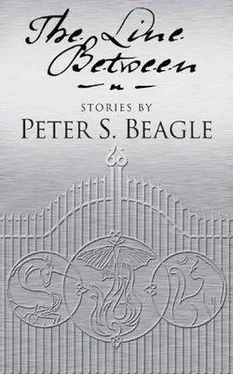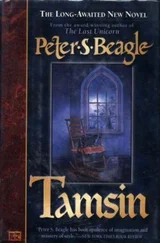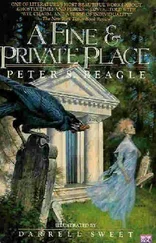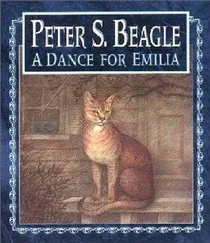Peter Beagle - The Line Between
Здесь есть возможность читать онлайн «Peter Beagle - The Line Between» весь текст электронной книги совершенно бесплатно (целиком полную версию без сокращений). В некоторых случаях можно слушать аудио, скачать через торрент в формате fb2 и присутствует краткое содержание. Жанр: Фэнтези, на английском языке. Описание произведения, (предисловие) а так же отзывы посетителей доступны на портале библиотеки ЛибКат.
- Название:The Line Between
- Автор:
- Жанр:
- Год:неизвестен
- ISBN:нет данных
- Рейтинг книги:5 / 5. Голосов: 1
-
Избранное:Добавить в избранное
- Отзывы:
-
Ваша оценка:
- 100
- 1
- 2
- 3
- 4
- 5
The Line Between: краткое содержание, описание и аннотация
Предлагаем к чтению аннотацию, описание, краткое содержание или предисловие (зависит от того, что написал сам автор книги «The Line Between»). Если вы не нашли необходимую информацию о книге — напишите в комментариях, мы постараемся отыскать её.
The Line Between — читать онлайн бесплатно полную книгу (весь текст) целиком
Ниже представлен текст книги, разбитый по страницам. Система сохранения места последней прочитанной страницы, позволяет с удобством читать онлайн бесплатно книгу «The Line Between», без необходимости каждый раз заново искать на чём Вы остановились. Поставьте закладку, и сможете в любой момент перейти на страницу, на которой закончили чтение.
Интервал:
Закладка:
He sold the cello. To his friend Progorny. No fuss, no sentimental self–indulgence — his wife needed extensive (and expensive) medical care. and that was the end of that. Any one of us would have done the same; what was all the to–do about? At least, the Fabregas would stay in the family, just to his left, every night, while he himself made cheerful do on a second–hand DeLuca found pawned in Gradja. There are worse cellos than DeLucas. I am not saying there aren't.
But the bloody thing threw off the balance of the strings completely. How am I to
explain this to you, who declare yourself no musician? We have always been weak in the lower registers, as I have admitted: Andrichev and that instrument of his had become, in a real sense, our saviors, giving us depth, solidity, a taproot, a place to come home to. Conductor and concertmaster, I can tell you that none of the Greater Bornitz Municipal Orchestra — and in this I include Herr Sigerson himself — actually took their time from me. Oh, they looked toward me dutifully enough, but the corners of their eyes were focused on the cello section at all times. As well they should have been. Rhythm was never my strong suit, and I am not a fool — I have told you that as well.
But there are cellos and cellos, and the absence of the Fabregas made all the difference in the world to us. That poor pawnshop DeLuca meant well, and it held its pitch and played the notes asked of it as well as anyone could have asked. Anyone who wasn't used — no, attuned — to the soft roar of the Fabregas, as our entire orchestra was attuned to it. It wasn't a fair judgment, but how could it have been? The sound wasn't the same; and, finally, the sound is everything. Everything. All else — balance, tempo, interpretation — you can do something about, if you choose; but the sound is there or it isn't, and that bloody ancient Fabregas was our sound and our soul. Yes, I know it must strike you as absurd. I should hope so.
Progorny gave it his best — no one ever doubted that. It was touching, poignant, in a way: he seemed so earnestly to believe that the mere possession of that peerless instrument would make him — had already made him — a musician equal to such a responsibility. Indeed, to my ear, his timbre was notably improved, his rhythm somewhat firmer, his melodic line at once more shapely and more sensible. But what of it? However kindly one listened, it wasn't the sound. The cello did not feel for him what it felt for Andrichev, and everyone knew it, and that is the long and the short of it. Musical instruments have neither pity nor any notion of justice, as I have reason to know. Especially the strings.
Whatever Progorny had paid him for the cello, it could not have been anything near its real value. And Lyudmilla grew worse. Not that I ever visited her in her sickbed, you understand, but you may believe that I received daily — hourly — dispatches and bulletins from Andrichev. It very nearly broke my peevish, cynical old heart to see him so distraught, so frantically disorganized, constantly racing back and forth between the rehearsal hall, the doctor's office, and his own house, doing the best he could to attend simultaneously to the wellbeing of his wife and that of his music. For an artist, this is, of course, impossible. Work or loved ones, passions or responsibilities … when it comes down to that, as it always does, someone goes over the side. Right, wrong, it is how things are. It is how we are.
Yes, of course, when I look back now, it was remiss of me not to go to Lyudmilla at the first word of her illness. But I didn't like her, you see — what a sour old person I must seem to you, so easily to detest both her and your hero Mr. Sigerson — and I was not hypocrite enough, in those days, to look into those ingenuous blue eyes and say that I prayed for the light of health swiftly to return to them once more. Yes, I
wanted her to recover, almost as much as I wanted her to leave her husband alone to do what he was meant to do — very well, what I needed him to do. Let her have her lovers, by all means; let her sing duets with them all until she burst her pouter–pigeon breast; but let me have my best cellist back in the heart of my string section — and let him have his beautiful Fabregas under his thick, grubby, peasant hands again. Where it belonged.
Mind you, I had no idea how I would ransom it back, and reimburse Progorny (sad usurper, cuckolded by his own instrument) the money that had gone so straight to Lyudmilla's physician. And kept going to him, apparently, for Lyudmilla's condition somehow never seemed to improve. Andrichev was soon enough selling or pawning other belongings — books to bedding, old clothes to old flowerpots, a warped and stringless bouzouki, a cracked and chipped set of dishes — anything for which anyone would give him even a few more coins for his wife's care. Many of us bought worthless articles from him out of a pity which, not long before, he would have rejected out of hand. I wonder whether Sigerson still has that cracked leather traveling bag with the broken lock — I think the motheaten fur cloak is somewhere in my attic. I think so.
None of us ever saw Lyudmilla Plaschka at all anymore — the doctor, a Romanian named Nastase, kept her quarantined in all but name — but we read her worsening condition, and the wasteful uselessness of each new treatment, in Andrichev's face. He shrank before our eyes, that bear, that ox, call him what you like; he hollowed and hunched until there seemed to be nothing more to him than could be found inside his cello. Less, because the Fabregas, and even the DeLuca, made music of their emptiness, and Andrichev's sound — there it is again, always the sound — grew thinner, dryer, more distant, like the cry of a lone cricket in a desert. I still squirm with bitter shame to recall how hard it became for me to look at him, as though his despair were somehow my doing. My only defense is that we were all like that with him then, all except his comrade Progorny. And Sigerson, remote and secretive as ever, who, nevertheless, made a point of complimenting his playing after each performance. I should have done that, honesty be damned — I know I should have. Perhaps that is why the memory of that man still irritates me, even now.
Then, one late summer afternoon, with Sigerson's comment, «We are more alike than you may think, Herr Takesti," continuing to plague me, I determined to pay a call on Lyudmilla Plaschka myself. I even brought flowers, not out of sympathy, but because flowers (especially a damp, slightly wilted fistful) generally get you admitted everywhere. I must say I do enjoy not lying to you.
Andrichev's house, which looked much as he had in the good days — disheveled but sturdy — was located in the general direction of the Widow Ridnak's farm, but set some eight miles back into the barley fields, where the dark hills hang over everything like thunderheads ripe with rain. I arrived just in time to see Dr. Nastase — a youngish, strongly built man, a bit of a dandy, with a marked Varna accent — escorting a tattered, odorous beggar off the property, announcing
vigorously, «My man, I've told you before, we're not having your sort here. Shift yourself smartly, or I'll set the dogs on you!» A curious sort of threat, I remember thinking at the time, since the entire dog population of the place consisted only of Lyudmilla's fat, flop–eared spaniel, who could barely be coaxed to harass a cat, let alone a largish beggar. The man mumbled indistinct threats, but the doctor was implacable, shoving him through the gate, latching and locking it, and warning him, «No more of this, sir, do you understand me? Show your face here again, and you'll find the police taking an interest in your habits. Do you understand?» The beggar indicated that he did, and meandered off, swearing vague, foggy oaths, as Dr. Nastase turned to me, all welcoming smiles now.
Читать дальшеИнтервал:
Закладка:
Похожие книги на «The Line Between»
Представляем Вашему вниманию похожие книги на «The Line Between» списком для выбора. Мы отобрали схожую по названию и смыслу литературу в надежде предоставить читателям больше вариантов отыскать новые, интересные, ещё непрочитанные произведения.
Обсуждение, отзывы о книге «The Line Between» и просто собственные мнения читателей. Оставьте ваши комментарии, напишите, что Вы думаете о произведении, его смысле или главных героях. Укажите что конкретно понравилось, а что нет, и почему Вы так считаете.












